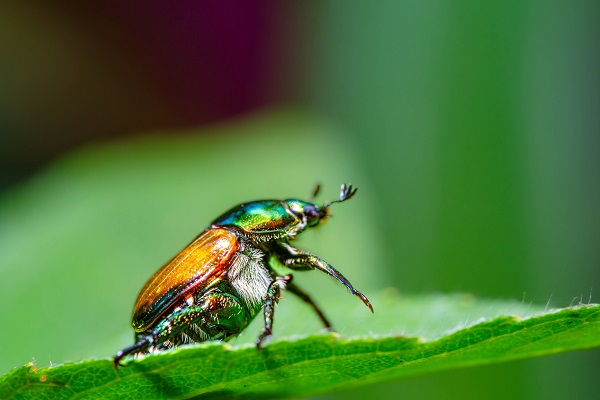
Dealing with Japanese beetles can be a challenging task, but with a combination of preventive measures and control methods, you can effectively reduce their population and protect your lawn and garden. Here are some strategies to eliminate Japanese beetles:
Handpicking
In small infestations, manually removing Japanese beetles from your plants can be effective. Wear gloves and drop them into a bucket of soapy water to drown them. Early morning or late evening is the best time for handpicking, as the beetles are less active during those periods.
Neem Oil
Neem oil is a natural insecticide that can be effective against Japanese beetles. Dilute neem oil according to the instructions on the product label and spray it on the affected plants. Neem oil disrupts the beetles’ feeding and mating habits, reducing their population over time.
Milky Spore Disease
Milky spore disease is a biological control method that targets Japanese beetle larvae in the soil. Apply milky spore powder or granules to your lawn according to the package instructions. The spores infect and kill the larvae, preventing them from developing into adult beetles.
Bacillus thuringiensis
Bacillus thuringiensis or Bt is a naturally occurring soil bacterium that is effective against Japanese beetle larvae. Apply Bt products, specifically targeting grubs, to your lawn according to the package instructions. The larvae ingest the Bt, leading to their death. Read this article to learn more about Bt and how it works.
Row Covers and Netting
Cover susceptible plants with row covers or fine netting to physically exclude adult beetles. This method works best for smaller plants or when used to protect high-value plants from heavy infestations. Ensure the covers are well-secured to prevent beetles from accessing the plants.
Companion Planting
Some plants repel Japanese beetles due to their scent or natural properties. Consider planting repellent species, such as garlic, chives, marigolds, catnip, or rue, around vulnerable plants. This can help deter adult beetles and reduce feeding damage. Read this article for more information on companion planting.
Natural Predators
Encourage natural predators of Japanese beetles, such as birds, toads, or beneficial insects like tachinid flies and parasitic wasps, to inhabit your garden. Provide habitat, water sources, and shelter to attract these beneficial organisms.
Chemical Control
If other methods prove insufficient, you may consider using chemical insecticides. Select a product specifically labeled for Japanese beetles and follow the instructions and precautions carefully. Apply the insecticide when beetles are most active, typically in the morning or evening.
Remember, it’s crucial to implement a combination of control methods and practice ongoing monitoring to manage Japanese beetles effectively. Regularly inspect your plants and act at the first sign of infestation to prevent severe damage.
Related Articles & Free Email Newsletter Sign Up
How to Prevent & Eliminate Fly Infestations
Soap, Oil and Other Homemade Insecticides and Fungicides
Why Green Lacewings Are the Best General Predator for Gardens & Greenhouses



Comment here